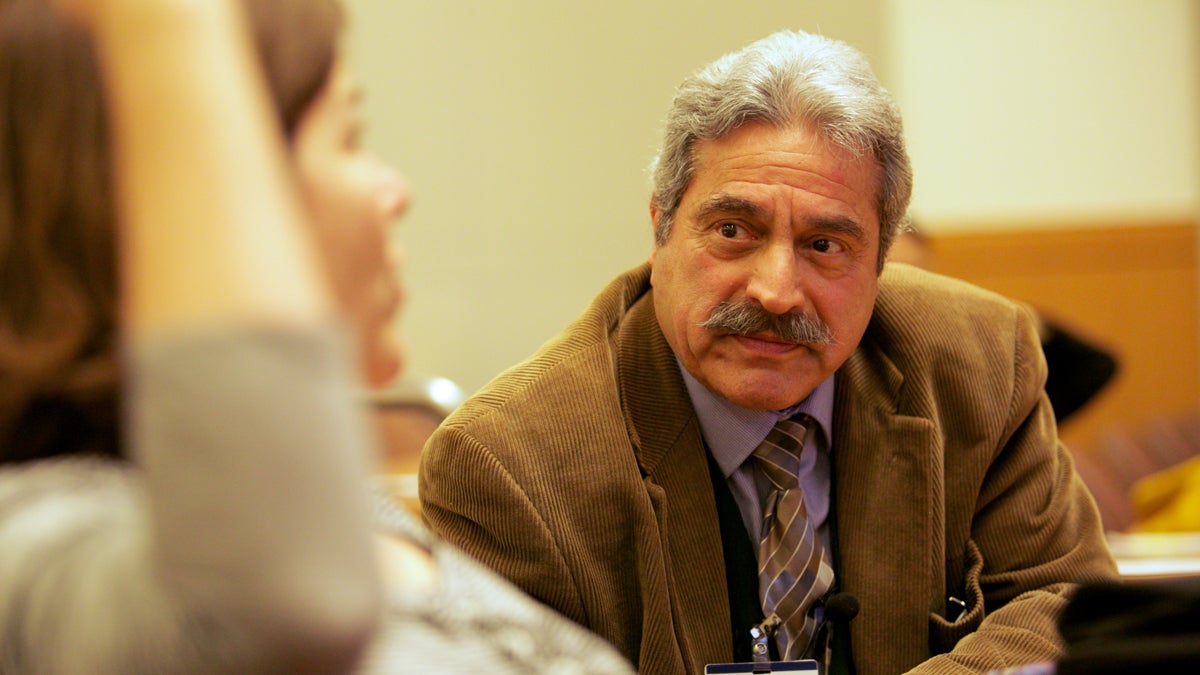Bedside manner matters, but maintaining physicians’ empathy levels requires some TLC
Listen
Mohammadreza Hojat Ph.D. discusses teaching empathy to medical students at Jefferson Medical School. (Nathaniel Hamilton/For Newsworks)
What do patients want from physicians? Skills? A laser-sharp brain? A steady hand? Sure. But – they want something else, too.
Poor bedside manners. It’s a top complaint when people talk about health care. And gripes about thoughtless, tactless, or maybe even mean doctors bring up an important question. What do patients want from physicians? Skills? A laser-sharp brain? A steady hand? Sure. But – they want something else: Kindness. Empathy.
Adding insult to injury, or suffering
Intense pelvic pain had plagued New York city writer Andrea Karabetsos for quite some time, but no doctor had been able to figure out what was causing it. One night, the pain got so bad, her pain killers weren’t helping. She decided to go to the emergency room and, after a long wait, a doctor came to see her.
“She had the meanest face I have ever seen. She sighed and said: ‘now, what’s going on?'” recalled Karabetsos. After Karabetsos described her symptoms, the doctor said to her “you have pain killers, so why are you here?”
Karabetsos said the doctor made her feel belittled and vulnerable. She was later diagnosed with a pelvic muscle disorder, and is receiving treatment.
Philadelphian Adrienne Berger was sitting with her dying mother in a hospital room. Her mother had been taken off life support, and it was only a matter of time before she would pass.
A doctor came in to check her mother’s vital signs. “He said, very matter of factly, ‘the patient has expired at so-and-so hour,’ Berger said. She said she was so stunned by his lack of empathy, she couldn’t speak. Before she said anything, the physician left the room.
“If he had just taken a short minute to think about who are you talking about. This is not some nameless, faceless patient, this is a woman who had a life, and her name was Jeanette Berger,” she said. Berger added that perhaps the physician could have put his hand on her shoulder, and said that he was sorry for her loss.Berger replays the moment in her mind often, and feels that it made an already difficult and painful event much worse.
Empathy requires some TLC to stay, grow
Being an empathic physician requires attention and intention, says Penn internist Karen Bowles.
“It’s really a practice of witnessing, understanding, and walking beside the patient,” she says.
It’s different from sympathy – which might involve pity, or feeling a patient’s suffering. Empathy means acknowledging the patient’s plight. Really trying to understand what is happening. And when physicians exhibit this quality – it affects medical outcomes.
“We have shown that patients who are treated by empathic physicians are better off,” explained Dr. Mohammadreza Hojat of Jefferson University Hospital.
Hojat is a professor in the department of psychiatry at Jefferson, a psychologist – and is one of the leading researchers on empathy. His interest in human relationships drew him to this issue – but he studies it like a scientist. “You have to study this notion empirically, provide some tangible evidence that there is a relationship between x and y.”
Hojat developed the “Jefferson scale of empathy” – which measures and grades empathy in health care providers and medical students through a series of questions.
Hojat says the scale has allowed his team to quantify the impact of empathy – for example showing that diabetic patients cared for by empathic doctors stay healthier.
Hojat also used his scale to track empathy levels in medical students over time, and found a decline over time.
“As they progress through medical school, empathy goes down, and more significantly so in third year when curriculum shifts toward patient care.”
Hojat says there could be several reasons for this decline. “There’s so much emphasis on science of medicine, which is fine, but there is a benign neglect in teaching the art of medicine.”
Hojat also says computers and other devices can be intrusive in patient care.
He has developed several targeted “interventions” – workshops and lectures on empathy. For example, he shows students a series of film clips, each clip contains a teaching moment on empathy. They then discuss the physician’s conduct in the clip, and why it was good or bad.
Hojat has found that these lectures increase empathy levels in students – but there’s a catch.
“We can improve empathy by exposing them to targeted educational programs, but when we follow up two or three months later, the enhanced scores went back down.” So, in order to make it stick, you have to continually discuss empathy with students.
Practicing being present
And that struggle doesn’t end in medical school.
Penn internist Karen Bowls says as you are listening to a patient, you can feel yourself being pulled into different directions, remembering calls you have to return, prescriptions that need to be filled, maybe you’re thinking about your last patient.
One day, this happened, and suddenly Bowles’ patient said: “Dr. Bowles? Are you looking at another patient’s file while I’m talking to you?”
Bowles said she had to admit that, yes, that was true, and apologized to her patient.
Bowles says the practice of mindfulness meditation has been very helpful. She took a course on mindfulness over 10 years ago – it’s the practice of being present in the moment, noticing your thoughts, and guiding your attention back to what’s happening right now. Bowles says it helps her truly be with patients. She now notices when her attention drifts to other things.
“My intention is to let it go, and to see if I can use eye contact to come back and notice what’s right in front of me, making conscious attempts over and over again to come right back.”
Bowles now teaches mindfulness to other healthcare providers at the Penn Program for Mindfulness. She says empathy makes her work as a physician more fulfilling and satisfying.
“If I’m able to really pay attention and find a way to connect with their experience, that allows those clinical encounters to be very enriching and rewarding, versus doing the same thing in an auto-pilot mode, which leaves me feeling more exhausted.”
WHYY is your source for fact-based, in-depth journalism and information. As a nonprofit organization, we rely on financial support from readers like you. Please give today.




